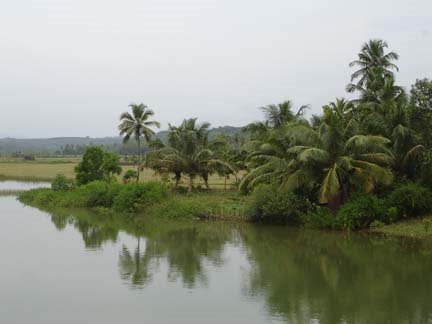Which is the earliest popular fruit in the Indian subcontinent? In my opinion, it is the humble jack fruit which was the most popular and possibly earliest used fruit in the Indian subcontinent. The fruit was called the ‘pela’ in Tulu, ‘palas’ in Kannada or simply the ‘phala’ in Sanskrit. Micheal Wizel (1999) who made a detailed analyses of the words used in Rigveda, the earliest Veda dated around 1700 BCE (early part of Rigveda), concluded that it contains several extraneous words that do not belong to the word structure of Sanskrit sensu stricto. Sanskrit words derived from Indo-european roots have a specific structure. His list of extraneous words includes the term ‘phala’.
Obviously, the extraneous Sanskrit word ‘phala’ in Rigveda must have been derived from the Tulu words ‘pela’ or ‘pala’ or the early Kannada word ‘palas’. Since the borrowed Sanskrit word ‘phala’ (=fruit) itself stands for the jack fruit, it should have been the most common fruit in those days and in those areas.
In Tulu language, both the ‘pela’ and ‘pala’ word versions are there. The Tulu word ‘palai’ (=wooden plank) is derived from ‘pala’ or ‘pela’ (=jack tree). The jack tree trunk was used for making wooden planks that were called ‘palai’.
The borrowing of Tulu/ Kannada/Dravida words into Rigveda by early scholars of Vedic tribes suggest that all these (Vedic, Tulu and other Dravida) tribes were living together (coexisting) in the Pirak region ca.1700 BCE, where early Vedas are considered to have been composed orally.



The Malayalam word for Jack fruit is chakka. (ചക്ക) but the tree which bears the jack fruits is called pilav. (പിലാവ് or പ്ലാവ്.) This Malayalam word has similarity with ‘pela’ and ‘pala’ in Tulu. Wooden plank is called "pala" or "palaka" in malayalam. t.k.abdulla kunhi, Fairuz Mahal, Ayathil Nagar, Post Ayathil, Kollam. 21, Pincode: 691021. mob. 9447112066
ReplyDeleteThe English word jack fruit may be derived from Portuguese word ' jaca', or Malayalam word ":chakka"
ReplyDeletet.k.abdulla kunhi, Fairuz Mahal, Ayathil Nagar, Post Ayathil, Kollam. 21, Pincode:691021. Mob: 9447112066